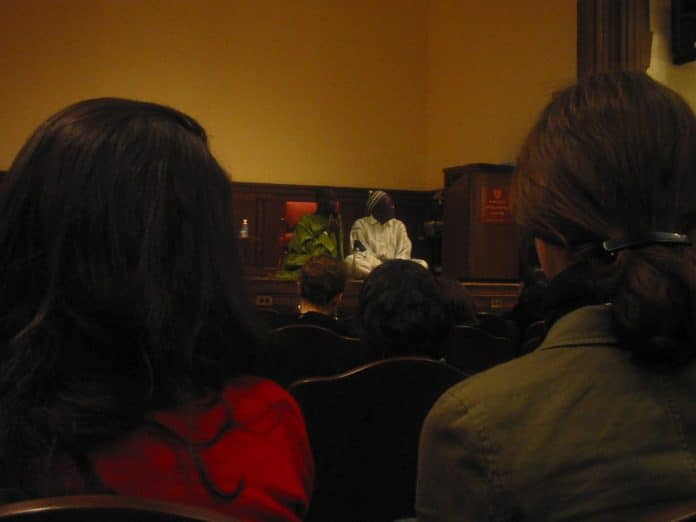
Linkbox om Ousmane Sembène (1923-2007), senegalsk forfatter og filminstruktør.
Den senegalske forfatter og filmmand Ousmane Sembène fødes 1. januar 1923 og dør 9. juni 2007.
Efter forskellige manuelle jobs og arbejde som strejkeorganisator og fagforeningsmand, fik han gennembrud som forfatter, der skrev om disse erfaringer (på dansk, se Bibliotek.dk).
Efter Senegals uafhængighed i 1960 vendte han tilbage og for at nå et større publikum begyndte han som filmskaber, og gav afrikansk film international anerkendelse.
Tidsskriftcentret, juni 2009. Opdateret juni 2022, Socialistisk Bibliotek
Se på socialistisk Bibliotek:
- Emneoversigten: Film
- Emneoversigten: Afrika / Africa
Leksikale mv.
- Ousmane Sembène (Denstoredanske). Kortere intro.
- Sembène Ousmane (Wikipedia.dk). Længere intro.
- Sembéne Ousmane (IMDb, Internet Movie Database).
- Ousmane Sembène (Wikipedia.org). Længere på engelsk.
- African cinema (Wikipedia.org)
- Ousmane Sembène (Postcolonial Studies, Emory University, Atlanta). Biografisk og politisk intro.
Film
Ousmane Sembéne (YouTube). With many of Sembénes film online.
Artikler/Articles
POV International
Ousmane Sembène, Senegals berømte filmskaber, endelig på Cinemateket (8. november 2020)
“Karen Hammer, som gennem 20 år har været en slags uofficiel ambassadør for afrikansk film, ridser hans karriere og betydning op og opfordrer til at give afrikansk film en chance.”
Against the Current
Remembrance: Ousmane Sembène, father of African film (No.132, January/February). Kim D. Hunter interviews Louise M. Jefferson:
“The father of African Cinema, the prolific Ousmane Sembène died at the age of 84 in June of 2007.”
CounterPunch
Sembène and the spirit of rebellion. By Louis Proyect (October 30, 2015)
“Sembène is a great introduction to the man’s films. For a passionate fan of his work, it offered me new insights into what motivated him.”
International Socialism
The literature of a ravished continent: Achebe, Sembène and Ngugi. By Ken Olende (Issue 115, Summer 2007)
“During the late 1950s and early 1960s a wave of new literature emerged from a defiant Global South. Some of the best came from Africa, then caught up in a range of anti-colonial struggles and the promise of independence.”
Jacobin
One hundred years of Ousmane Sembène. By Tsogo Kupa (February 12, 2023)
“This year marks the hundredth anniversary of the birth of the Senegalese filmmaker Ousmane Sembène. His films — dazzling portraits of Senegalese and French society — represent some of the most brilliant attempts to think about the limits and possibilities of political art.”
Jump Cut
At the global market: Ousmane Sembène’s Moolaadé and the economics of women’s rights. By Amy E. Borden (No.53, Summer 2011)
“As both a tool used by contemporary activists, such as Tostan, and within its plot, Ousmane Sembène’s final film Moolaadé demonstrates how West African women may gain collective access to juridical and political power by using local cultural customs to resist the practice of female genital cutting.”
Come Back Africa and South African film history. By Ntongela Masilela (No.36, May 1991)
“The first serious theoretical formulations of the ideology and philosophy of apartheid, which has had horrendous consequences on South African film culture, found expression in mining publications. Apartheid ideology completely shaped the structure of South African films.”
Anglophone African media. By N. Frank Ukadike (No.36, May 1991)
“The story of African cinema offers a lesson in struggle against bureaucratic and economic forces which began in colonial times and reaches into the present.”
Technological paternalism: Sub-Saharan African film production. By Manthia Diawara (No.32, April 1987)
“Not only film production but also distribution in Africa has faced a ruthless and monopolistic exploitation by American, European, and the Indian distribution companies. The film industry in Africa has no government protection …”
Emitai and Ceddo: Women in Sembene’s films. By Gorham H. Kindem and Martha Steele (No.36, May 1991)
“Sembène’s films depict women playing a crucial role in Africa’s development … Sembene does not uncritically portray women as passive objects of male desire. Unlike in many Hollywood films, female characters in Sembene’s films act as agents of both group solidarity and social change.”
Three faces of Africa: Women in Xala. By Françoise Pfaff (No.27, July 1982)
“This film takes place among Black Africa’s growing middle class, which is doomed to lose its power unless it stops aping the Western world and identifies with the needs and social aspirations of the African masses.”
Spillefilmen “Xala”, 1975 (YouTube.com, 2:02:53 hour). English subtitles.
Se om filmen på Wikipedia.org og posten ovenfor.
Marxmail.org
Interview with Ousmane Sembene. By Samba Gadjigo (April 11, 2004; online at Internet Archive)
“After more than three years of work, Ousmane Sembene has just completed the final touches on his feature film Moolaade.”
Ousmane Sembene and his revolutionary images. By Samba Gadjigo (2004; online at Internet Archive)
“From the forthcoming book Ousmane Sembene: The Life of a Revolutionary Artist.”
MR Online
Ousmane Sembène: the Cineaste who has not finished his mandate: at 84, the Senegalese director continues to shoot films. By Hamid Tahri (September 28, 2006)
“His films strike like blows, because he cannot but make cinema a mode of struggle.”
Socialist Review
A classic read: God’s Bits of Wood. By Jennifer Wilkinson (Issue 365, January 2012)
“In 1947, black railroad workers took all-out strike action along the Dakar-Niger railway … It is this historic event, considered by many to be the turning point in the anti-colonial struggle in Senegal, that Sembène Ousmane powerfully captures in his classic novel.”
Obituary: Ousmane Sembène. By Leo Zeilig (Issue 316, July/August 2007)
“Ousmane Sembène was one of those rare people whose death feels like a personal loss even to those who did not know him. We have lost a great mind.”
Socialist Worker
Ousmane Sembène 1923-2007. By Ken Olende (Issue 2055, 16 June 2007; online at Internet Archive)
“A film maker, novelist and radical from Senegal in West Africa, Ousmane Sembène consistently opposed imperialism.”
Interview with Ousmane Sembène – father of African film (Issue 1955, 11 June 2005)
“In London to promote his new film, Moolaadé, Senegalese film maker and novelist Ousmane Sembène spoke to Ken Olende and Charlie Kimber.”
World Socialist Web Site
Ousmane Sembène’s Borom Sarret and Black Girl. By Joanne Laurier (17 January 2006)
“Ousmane Sembène, Senegalese author, scenarist and film director, has been making films for over 40 years. New Yorker Video has recently released two of Sembène’s earliest and most remarkable cinematic works on DVD.”
The struggle against superstition in a West African village. By Mile Klindo (27 July 2005)
“Moolaadé is the second movie in a trilogy by 82-year-old Senegalese novelist and filmmaker Ousmane Sembène. It is set in a West African village and dramatises the struggle against the ancient practice of female genital mutilation.”




















![George Habash square [Tulkarem?], Taken on 7 April 2011, Source: https://www.panoramio.com/photo/50717122. Author: Mujaddara. (CC BY-SA 3.0)](https://socbib.dk/wp-content/uploads/2007/05/George_Habash_sq_-_panoramio-218x150.jpg)











